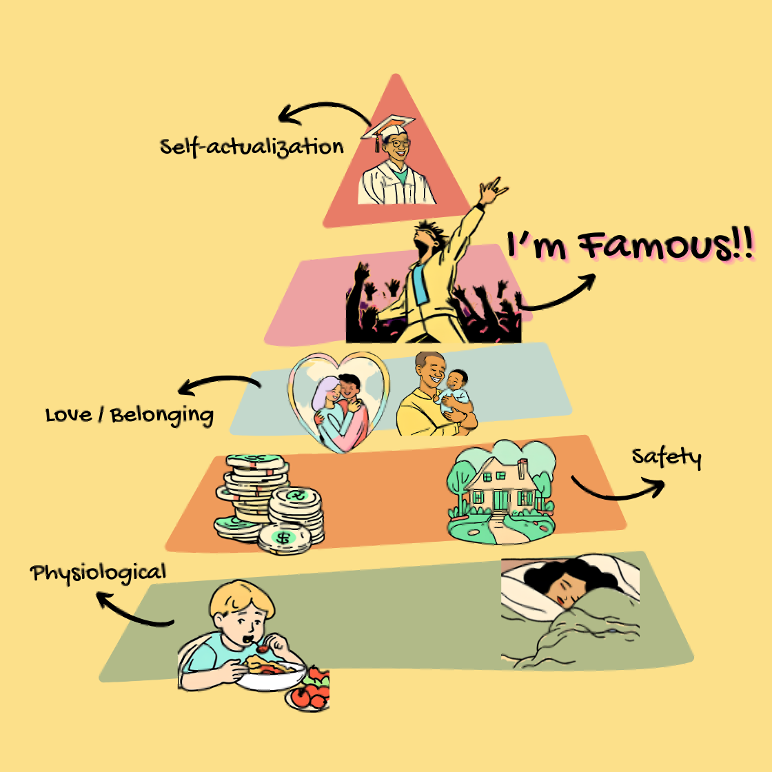“My drive in life is from this horrible fear of being mediocre. And that’s always pushing me.
Because even though I’ve become somebody, I still have to prove I’m somebody.”
– Madonna

The idea that “we all want to be famous” ties into some deep-rooted human instincts. It’s more than just a modern social media phenomenon — it taps into our primal desires for confidence, achievement, respect from others, recognition, status, and independence. But the craving for attention is nothing new, it’s just amplified now that everyone has a social media presence.
LET’S EXPLORE WHERE THIS DESIRE COMES FROM
1. Psychological Drivers
Humans are social creatures, and we’re wired to seek acceptance and admiration from our peers. Being recognized makes us feel valued and important. Fame, even in small doses (like getting likes on a photo), triggers the brain’s dopamine reward system — the same chemical reaction that happens when we eat food or win a prize.
2. Survival and Reproduction
The drive for fame actually parallels the biological behaviors seen in the animal kingdom, particularly around mating and survival. In nature, animals compete to stand out, secure mates, and pass on their genes. This happens through physical competition or display and showmanship.
For humans, the need to “stand out” evolved alongside these instincts. Social status in early tribes meant better access to resources, mates, and protection. In today’s world, social media acts like a digital version of this competition. Likes, followers, and views are the new feathers and antlers.
3. Fame Today
While ancient humans showed off physical strength or leadership, today’s “fame” often comes from the following:
- Showing off wealth.
- Being attractive or fit.
- Being funny, smart, or opinionated. Showing your intelligence and charisma.
- Even creators who seem to be “keeping it real” are, in a way, still performing authenticity — hoping to stand out from the crowd.
4. Spotlight Addiction
Once someone gets attention, it’s hard to let go of the spotlight. This ties into status anxiety, which is the fear that losing fame means losing importance. This fear of becoming irrelevant drives people to create more extreme content to stay noticed. Public validation can become more important than real-world relationships or even self-respect.
DON’T BELIEVE YOUR OWN HYPE
Being famous on social media can lead to “believing your own hype”. This phenomenon lies in the way social media rewards visibility, not necessarily quality or truth. Here’s a breakdown of how this cycle works:
1. The Transformation from Creator to “Expert”
When someone’s content goes viral — even if it’s based on opinion, clickbait, or sensationalism — they start seeing themselves as an authority. They confuse popularity with expertise. Getting thousands of likes and comments feels like validation, even if the content lacks substance or accuracy.
2. Outrage is seen as Engagement
Audiences are drawn to content that sparks an emotional response — whether it’s anger, shock, or admiration. This fuels the exaggeration-cycle:
- The more extreme the content, the more attention it gets. Algorithms favor content that keeps people watching, liking, and commenting — even if the information is false or misleading.
- Creators feel pressured to one-up themselves. To keep the momentum, they make their next video even more exaggerated, leading them to double down on their opinions, no matter how unfounded.
3. The Illusion of Fame leads to a Reality Shift
Once someone starts gaining followers and sponsorships, it becomes harder for them to admit they might be wrong. They start believing they’re special. Fame itself becomes proof that they deserve the spotlight and admitting a mistake feels like losing status.
4. The Audience’s Role in Fueling the Hype
The audience plays a large part in fueling your hype — often without realizing it. The reasons for this are the following:
- They reward emotional content. Outrage, humor, and controversy get more shares than balanced articles.
- They treat influencers like idols. Fans defend their favorite creators, even when they’re proven wrong, because they feel personally connected to them.
- They prioritize entertainment over truth. Many people would rather watch an engaging rant than a calm, fact-based video.
CONCLUSION
In a world where social media gives everyone a stage, the desire for fame has evolved from a distant dream to an everyday pursuit. The applause is immediate, and the validation is addictive. However, it’s worth remembering that the likes, comments, and shares only tell part of the story. True worth isn’t measured by viral moments or follower counts. Believing your own hype can trap you in a performance, leaving little room for authenticity or self-growth. In the end, the most lasting “fame” may come not from how many people recognize your name, but from how genuinely you live — whether anyone’s watching or not.


